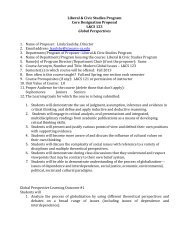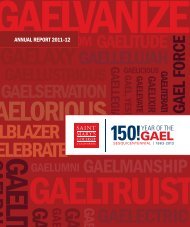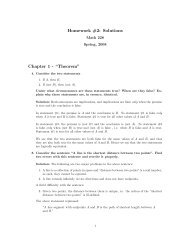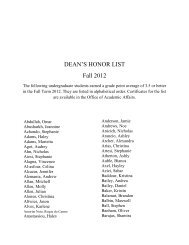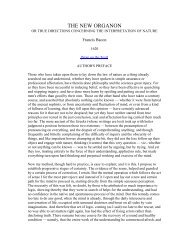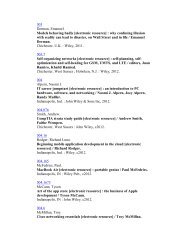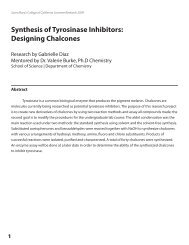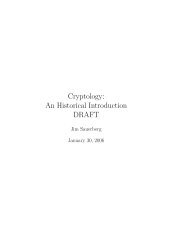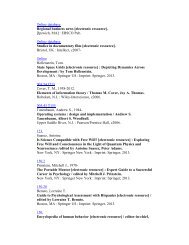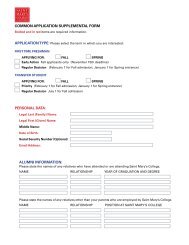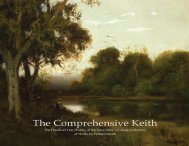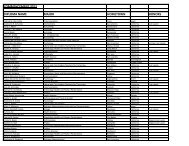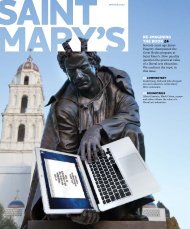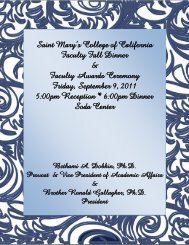2008-09 Catalog - Saint Mary's College of California
2008-09 Catalog - Saint Mary's College of California
2008-09 Catalog - Saint Mary's College of California
You also want an ePaper? Increase the reach of your titles
YUMPU automatically turns print PDFs into web optimized ePapers that Google loves.
Curriculum Philosophy116 Political PhilosophyAn investigation <strong>of</strong> the philosophical development <strong>of</strong> the notion <strong>of</strong> the“state,” “man’s relationship to the state,” and “forms <strong>of</strong> government.”117 Philosophy <strong>of</strong> NatureRaises the question <strong>of</strong> the possibility <strong>of</strong> a knowledge <strong>of</strong> nature whichis independent <strong>of</strong> the quantification and mathematical methods <strong>of</strong> the“physical” sciences.118 Theory <strong>of</strong> KnowledgeA study <strong>of</strong> the human approach to the nature <strong>of</strong> being, through ananalysis <strong>of</strong> the works <strong>of</strong> Sartre, Descartes, Kant, Hegel, Aristotle, andThomas Aquinas. Particular emphasis on the philosophical method andthe practice <strong>of</strong> reflection.130 –131 EthicsAn investigation <strong>of</strong> the difference between good and evil and betweenvirtue and vice; <strong>of</strong> the relationship <strong>of</strong> virtue to choice, to knowledge, topower, to pleasure, to happiness; <strong>of</strong> the relationship <strong>of</strong> the humanperson to God, to nature, to society; <strong>of</strong> the relationship <strong>of</strong> responsibilityto freedom and necessity. Texts (130) by Plato and Aristotle, the Bible,and Aquinas and (131) by Machiavelli, Hobbes, Locke, Rousseau, Hegel,Kant and Nietzsche. Philosophy 130 is prerequisite to 131.133 The Art <strong>of</strong> LogicA study <strong>of</strong> classical logic with reference to primary texts. Logic is approachedas the art <strong>of</strong> attending to and refining the acts <strong>of</strong> the discursive intellect —definition, predication, and argument (reasoning — in its coming to know).Among the major topics considered: signification, categories, predicables,categorical and complex propositions, syllogistic, induction, formal andinformal fallacies.135 –136 MetaphysicsA study, through close reading, discussing and writing, <strong>of</strong> “metaphysical”texts <strong>of</strong> (135) Plato and Aristotle (and, through them, <strong>of</strong> Parmenides andHeraclitus); and (136) <strong>of</strong> Thomas Aquinas and Hegel (with some attention,as time permits and inclination prompts, to texts <strong>of</strong> one or more<strong>of</strong> the following: Descartes, Kant, Wittgenstein, Heidegger).Philosophy 135 is prerequisite to 136.Authors and Schools160 A Critical Reading <strong>of</strong> the Principal Works<strong>of</strong> a Single Major Author or School <strong>of</strong> PhilosophySuch philosophers will be chosen as Plato, Aristotle, Thomas Aquinas,Descartes, Hume, Kant, Hegel, and Heidegger. A “school” <strong>of</strong> philosophy,e.g., Empiricism, Rationalism, Idealism, is <strong>of</strong>fered from time to time. Maybe repeated for credit as content varies.170 Contemporary PhilosophyA study <strong>of</strong> a major philosopher or “school” <strong>of</strong> the contemporary period.Course may be repeated for credit as content varies.172 ExistentialismReadings and discussions <strong>of</strong> some <strong>of</strong> the principal existential philosophers<strong>of</strong> the Continent, such as Kierkegaard, Camus, Sartre and Heidegger.174 Greek PhilosophyA study <strong>of</strong> the full range <strong>of</strong> Greek philosophical thought from its pre-Socraticorigins to its Neoplatonic conclusion. Platonic, Aristotelian, Cynic, Sceptic,Stoic and Epicurean Schools are examined through their texts, in historicalcontext and evolution.176 Medieval PhilosophersA consideration <strong>of</strong> the metaphysical and world view <strong>of</strong> major philosophers<strong>of</strong> the medieval period such as <strong>Saint</strong> Augustine and Thomas Aquinas.Course may be repeated for credit as content varies.178 Renaissance PhilosophersA survey <strong>of</strong> major thinkers and artists from early 14th century to 16thcentury. The concern will be with questions <strong>of</strong> God, man, and the world,and the contrast <strong>of</strong> the world <strong>of</strong> the Middle Ages and the beginning <strong>of</strong>the modern world.196 Senior Thesis /198 Senior Thesis — HonorsCandidates for the degree arrange, in the fall or spring <strong>of</strong> the senior year,a program <strong>of</strong> reading and research on a topic in modern/contemporaryphilosophy under a department director, and compose a lengthy SeniorThesis, which is presented publicly at a departmental meeting. Directionsfor proposing the thesis and a catalog <strong>of</strong> library resources are availablefrom the chair.197 Special StudyAn independent study or research course for students whose needs arenot met by the regular course <strong>of</strong>ferings <strong>of</strong> the department. Permission <strong>of</strong>the department chair and instructor required.199 Special Study — HonorsAn independent study or research course for upper-division majorswith a B average in philosophy. Permission <strong>of</strong> the department chair andinstructor required.146



